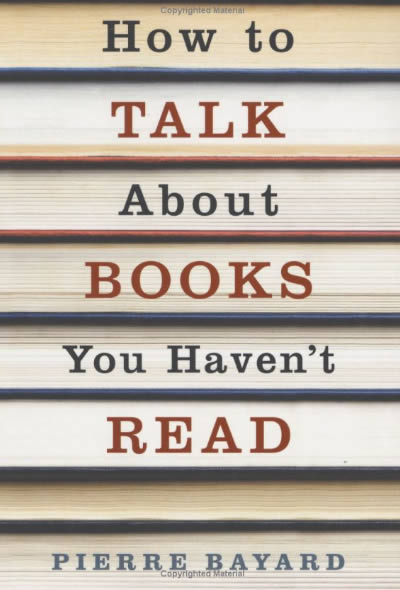
Pierre Bayard’s 2007 book How to Talk About Books You Haven’t Read is a real page turner.
The best I can tell, it’s an elaborate joke in which the authorial voice is a kind of fictional character. This character –I’ll call him Bayard while remaining agnostic about how he relates to the historical Bayard who actually authored the book– is utterly devoted to non-reading, and is impenitent about combining so much talking about books with so much non-reading of books.
There are some wonderful passages throughout the book, and even the Table of Contents is funny: Ways of Not Reading, Not Being Ashamed, Imposing Your Ideas, etc. But my favorite page comes very early, before the Preface, even. It’s a List of Abbreviations that includes, along with the obligatory Op. cit. and Ibid, these charming notations:
UB book unknown to me
SB book I have skimmed
HB book I have heard about
FB book I have forgotten
++ extremely positive opinion
+ positive opinion
– negative opinion
— extremely negative opinion
That’s good stuff, but it really pays off when Bayard starts using these abbreviations in the course of the book. For example, on p. 16, he observes
In his posthumously published book Against Sainte-Beuve, Proust advanced the theory that a literary work is the product of a different self from the person we know; in A la recherche de temps perdu, he illustrated this theory through the character of Bergotte.
And the footnotes dutifully record Bayard’s interaction with the two texts: HB+ and HB++, respectively. It’s a breathtaking kind of honesty. Imagine if all authors had to make some notation of the actual depth of their familiarity with every book they referred to! Later he shows that he can say intelligent things about Joyce’s Ulysses (HB++), such as its relationship to Homer’s Odyssey (SB and HB++).
Bayard uses enough irony and playfulness to throw anybody off track. Some of the heavier sentences sound like they could have come straight from serious practitioners of postmodern literary theory. For example,
Reading is first and foremost non-reading. Even in the case of the most passionate lifelong readers, the act of picking up and opening a book masks the countergesture that occurs at the same time: the involuntary act of not picking up and not opening all the other books in the universe.
or “the interior of the book is less important than its exterior, or, if you prefer, the interior of the book is its exterior, since what counts in a book is the books alongside it.” One almost (note quite –just almost) feels sorry for the poor graduate student who inevitably misses the joke and hangs a whole dissertation on this bold new non-literary non-theory.
How to Talk About Books You Haven’t Read is great fun, and is certainly a playful trickster of a text, but I don’t want to suggest that it’s nothing more than a prank. Bayard does actually shed a lot of light on the vast amounts of non-reading that surround and inform our reading. One of my routine academic practices is to read catalogs and reviews of books I will not read (the whole point is to see which ones I ought to read), but will continue to have some sort of opinion about. I even tell people about the existence of books I haven’t read, and they go read them and thank me for the “recommendation.” Surely some significant knowledge exchange occurs in this non-reading. In fact, I have often gone through the work of reading an entire book in my academic field, writing a careful review of it for publication, and then noticing that nearly everything I wrote in the review, especially the main value judgments about the book, were things I knew within ten minutes of first touching the book. Bayard, though puckishly disclaiming any intent to help, does surface some interesting points about the many ways readers talk about books they haven’t read. Perhaps the most alarming is the chapter on Books You Have Forgotten, “in which, along with Montaigne, we raise the question of whether a book you have read and completely forgotten, and which you have even forgotten you have read, is still a book you have read.” This chapter threatens to throw the whole library of books we have read over into the larger library of books we haven’t read, since a little meditation on forgetfulness shows that “saying we have read a book becomes essentially a form of metonymy,” and “when it comes to books, we never read more than a portion of greater or lesser length, and that portion is, in the longer or shorter term, condemned to disappear.”
Heady stuff! At least I think it’s heady stuff. I have to admit that I borrowed the book via inter-library loan, and it’s due back today, so I’m returning it SB++. Feel free to share this post about it HB+, if you like.